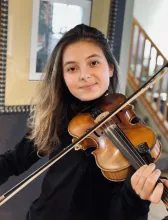
Music: It’s Effects and Superpowers on Teens
Music plays an important role in everybody's life. But have you ever thought about the educational benefits it has, especially on teens? Or how about the feeling of acceptance one can get from listening to their favorite song?
Music, especially playing music, has so many benefits to teens, including improved academic behavior, a chance for self-expression and creativity, and positive social aspects.
But sadly, many public schools in the US are lowering the budget for music classes or simply cutting off the music departments completely. Nearly 1.3 million students in public school systems across the country don’t have access to music classes.
There have been tons of studies proving the impact music lessons can have on your grades. Lessoninyourhome.net says that children who took a period of music a week for about 30 weeks showed significantly increased IQ levels, as well as better marks in standardized testing. But that's not all; according to nammfoundation.org, “Nearly 100% of past winners in the prestigious Siemens Westinghouse Competition in Math, Science and Technology (for high school students) play one or more musical instruments.” And this isn’t the only study showing the connection between math and music. The US department of education found that students who had been involved or played instrumental music over the middle and high school years performed better and showed higher levels of “math proficiency by grade 12.”
Music also does tremendous things to our memory- and I don’t just mean memorizing the lyrics to your favorite song. Reading music, or even just listening to music, helps your brain recognize patterns, and “music stimulates the parts of the brain that are related to math, reading, and emotional development.” (youthorchestrasfresno.org) But memory and music don’t just go together for teens- according to universityhealthnews.com, patients with dementia have improved language skills, as well as decreasing depression and anxiety just from listening to music. In nursing homes, they even started using musical therapy in order to help the elderly remember things of their past. (MithchdeKlein.org)
There is also a social aspect of music for teenagers. Most interpersonal relationships, for example dates, concerts, dances and parties are stimulated by music, and that's one of the reasons tandfonline.com considered music a ‘social lubricant.’ They also note that one's music taste is commonly used to “acquire a social perception” of someone. Duluthmusiclessons.rocks mentions another view- the traits and connections one can make with themselves upon playing or listening to music. They think that music enhances confidence in teens, allows self expression and gives a chance to expand creativity- and they are not alone. Capstonemusic.ca also thinks music has various benefits on the teenage brain and mind, including increased self discipline.
It’s pretty obvious that listening, learning and playing music has many benefits on the human mind. Music has a major role in everybody's life, and whether it's the lullaby your parents sang to you as a child, that concert you still remember like it was yesterday, or the 8 measures of “Baby Shark” you can’t get out of your head, music is a necessity for life and deserves awareness on it’s amazing superpowers.
Bibliography-
“The Positive Influence of Playing Music on Youth.” NAMM Foundation, 24 Oct. 2019, www.nammfoundation.org/articles/2014-06-09/Positive-influence-playing-music-youth
“Private Music Lessons In Your Home Or School.” Lessons in Your Home, 30 Apr. 2020, lessonsinyourhome.net/.
Unknown , Unknown. Youth Orchestras of Fresno, www.youthorchestrasfresno.org/.
Unknown. “Search Peer-Reviewed Journals and Articles.” Taylor and Francis Online, 2020, www.tandfonline.com/.
“Duluth Music Lessons.” Red Clay Music Foundry, 2014, duluthmusiclessons.rocks/.
“About Us.” Capstone Music, 24 Sept. 2020, capstonemusic.ca/about-us/.


